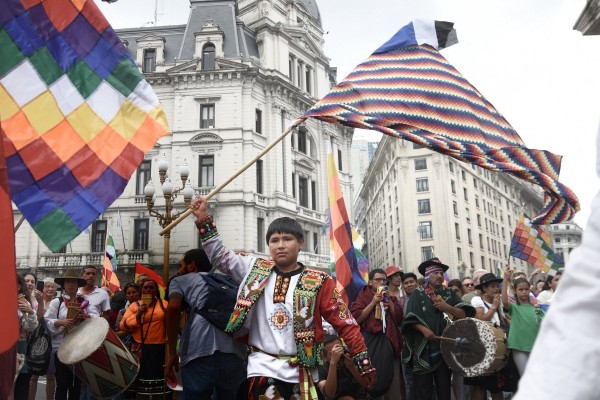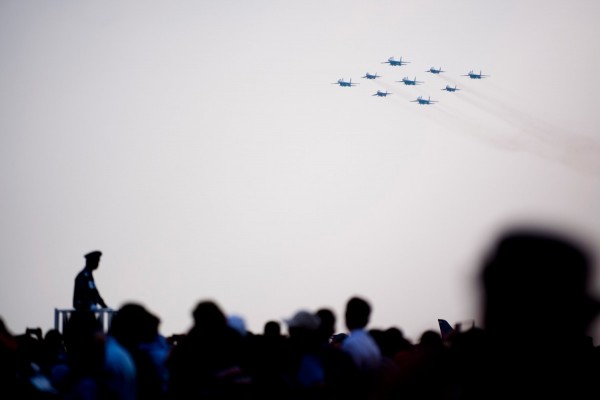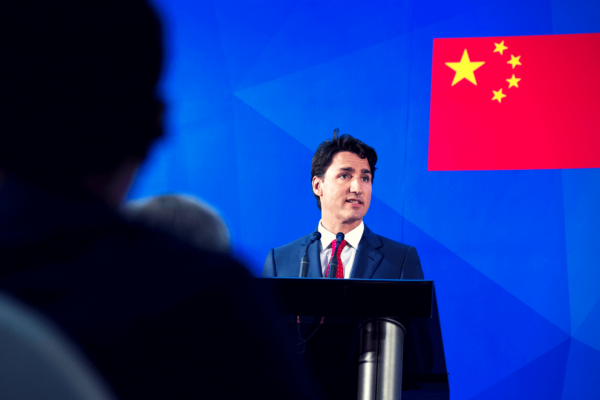Mark Carney’s silence on Venezuela reveals complicity
The prime minister’s inaction on a US massacre in the Caribbean echoes his past role in undermining Venezuela’s sovereignty
Canadian PoliticsLatin America and the CaribbeanUSA Politics

A still image from a video shared by President Donald Trump on Truth Social on September 2, 2025, depicting a US military strike against a boat in the Caribbean. Image courtesy @realDonaldTrump/Truth Social.
On September 2, the US military illegally bombed a small boat in the Caribbean, killing all 11 passengers. The Intercept reports that the drone strike was a criminal attack on civilians and that it involved multiple bombings. According to two US officials, survivors of the initial strike were “killed in a follow-up attack.”
The Trump administration attempted to justify the massacre by claiming—without evidence—that the boat belonged to the Tren de Aragua gang and was transporting drugs to the United States. Washington’s claim that such a small vessel could reach Florida has been widely disputed; in fact, there are indications the boat was headed for Trinidad and Tobago. Regardless of its destination, reports indicate that the passengers turned back after noticing the US military presence, only to be killed while retreating.
At first, the Venezuelan government suggested the footage could be fabricated. But on September 12, Interior Minister Diosdado Cabello stated: “A murder has been committed against a group of citizens.” He added that the US government had “openly confessed to killing 11 people,” stressing that the victims were not gang members: “We have done our investigations here in our country. There are the families of the disappeared who want their relatives, and when we asked in the towns, none were from Tren de Aragua, none were drug traffickers.”
This massacre comes amid two alarming developments earlier this year. Trump designated several drug cartels as “terrorist groups,” paving the way for military strikes against Latin American countries, and he has baselessly claimed that Venezuela’s government is itself a drug trafficking organization, a pretext for justifying military aggression. The second claim is demonstrably false. As journalist Nick Corbishley notes, Venezuela plays only a minor role in the drug trade. Over 85 percent of the world’s cocaine supply is transported via the Pacific, from ports in Colombia, Peru, and Ecuador. Meanwhile, Trump’s own claim that the Tren de Aragua gang is under Maduro’s control is contradicted by a declassified Department of Justice report.
To any clear-eyed observer, the boat strike was an illegal slaughter of non-combatants, carried out in the context of US lies designed to justify aggression against a regional adversary. Yet the Canadian government has remained silent. One day before the killings, Prime Minister Mark Carney spoke with Trump. He apparently made no comment about the US military’s encirclement of Venezuela’s coast. After the massacre, Carney still offered no condemnation. Canada’s Department of National Defence commented only that “The Canadian Armed Forces are aware of the evolving situation in the Caribbean.” The spokesperson added that the US military buildup around Venezuela would have “no impact” on joint US-Canadian operations—in other words, even as Washington prepares for an illegal strike on a major regional nation, Canada will continue business as usual.
Canada’s silence stands in sharp contrast to South America’s largest economies. Colombia’s President Gustavo Petro described the drone strike as “murder” that “breaks the universal principle of proportionality.” Brazil’s President Lula da Silva warned that “the presence of the armed forces of the largest power [the US] in the Caribbean Sea is a factor of tension.”
Carney’s indifference is not new. His hostility toward Venezuela predates his rise to prime minister. Although he played no official role in Justin Trudeau’s foreign policy—most notorious for leading the Lima Group regime-change campaign—Carney directly undermined Venezuela during his tenure as governor of the Bank of England.
In 2018 and 2019, Venezuela attempted to retrieve $1 billion in gold reserves stored at the Bank of England. Carney’s institution refused, citing Britain’s refusal to recognize Nicolás Maduro as president and the possibility that the transfer might violate sanctions or facilitate “criminal activity.” Before that decision, Carney was lobbied by Juan Guaidó, the self-proclaimed interim president of Venezuela, as well as US Secretary of State Mike Pompeo and National Security Advisor John Bolton. According to the Council of the Americas, officials at the Carney-led Bank of England met with Venezuelan Central Bank President Calixto Ortega and other authorities in December 2018. Soon after, Carney received communication from Guaidó asking him to reject “the illegitimate transaction.” Pompeo and Bolton also reportedly lobbied the bank to deny the Maduro administration’s request.
The British Foreign Office pressured Carney as well. On January 25, 2019, Alan Duncan, then minister of state for Europe and the Americas, recorded in his diary a phone call with Carney. “I tell Carney that I fully appreciate that, although it’s a decision for the Bank, he needs a measure of political air cover from us,” Duncan wrote. “I tell him I will write him the most robust letter I can get through the FCO lawyers, and it will outline the growing doubts over Maduro’s legitimacy and explain that many countries no longer consider him to be the country’s President.”
Carney obliged. By denying Venezuela access to its gold reserves—representing 15 percent of its international reserves—he deprived the country of a crucial lifeline during economic collapse, almost certainly worsening the humanitarian crisis and contributing to preventable deaths.
Seen in this light, Carney’s silence on the September 2 massacre is no longer passive. His past actions show a willingness to undermine Venezuela, support Washington’s regime change agenda, and empower opposition figures. Should the Trump administration escalate toward a direct strike, one can safely assume Carney will maintain his pose of “detachment.” But in the case of Venezuela, silence from Mark Carney is not neutrality. It is tacit approval.
Owen Schalk is the author of Targeting Libya: Canadian Dams, Canadian Bombs, an exploration of Canada’s pivotal yet little-known role in Libya’s history, forthcoming from Lorimer Books.










